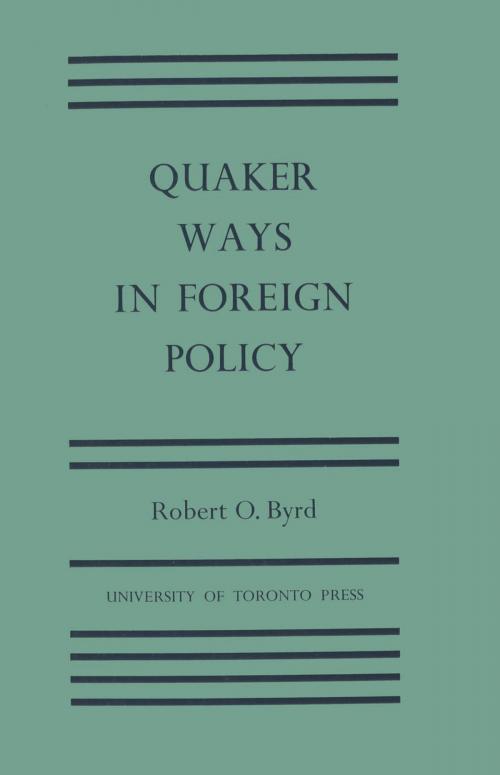Quaker Ways in Foreign Policy
Nonfiction, Religion & Spirituality, Christianity, Denominations, Quakers, Church, Church Institutions & Organizations, Church & State| Author: | Robert Byrd | ISBN: | 9781442651166 |
| Publisher: | University of Toronto Press, Scholarly Publishing Division | Publication: | December 15, 1960 |
| Imprint: | Language: | English |
| Author: | Robert Byrd |
| ISBN: | 9781442651166 |
| Publisher: | University of Toronto Press, Scholarly Publishing Division |
| Publication: | December 15, 1960 |
| Imprint: | |
| Language: | English |
For three hundred years the Society of Friends, or Quakers, has been forwarding to governments recommendations on foreign policy, and it has often been in the vanguard of thought in its social and political views. In this study, Dr. Byrd brings together and states carefully and accurately those beliefs, principles, attitudes, and practices which have been fundamental to the Quaker approach. He illustrates and verifies his statement by an analytical Friends acting in official and semi-official capacities, which relate to foreign policy and international relations.
Dr. Byrd’s systematic exposition of the modern Quaker’s theory of international relations offers a stimulating antidote to the realpolitik school of thought. His account of the Quaker interest in international affairs from 1647 to the present underlines for the diplomatic historian the role of morality in diplomacy, the influence of public opinion upon policy, and the part played by groups like Friends in shaping public attitudes. As Hans J. Morgenthau comments in his Foreword, “In a world which uses Christian ethics for un-Christian ends it is indeed moving to follow the historical trail of a Christian sect which seeks to transform itself and political society in the image of Christian teaching. . . . In their convictions, achievements, and sufferings the Quakers bear witness to the teachings of Christianity; in their failures they bear witness to the insuperable stubbornness of the human condition. . . . not the least of the merits of Professor Byrd’s book is his ability to convey through the movement of his mind and pen something of that moving quality which makes the Quaker approach to foreign policy, if nothing else, a noble experiment in Christian living.”
For three hundred years the Society of Friends, or Quakers, has been forwarding to governments recommendations on foreign policy, and it has often been in the vanguard of thought in its social and political views. In this study, Dr. Byrd brings together and states carefully and accurately those beliefs, principles, attitudes, and practices which have been fundamental to the Quaker approach. He illustrates and verifies his statement by an analytical Friends acting in official and semi-official capacities, which relate to foreign policy and international relations.
Dr. Byrd’s systematic exposition of the modern Quaker’s theory of international relations offers a stimulating antidote to the realpolitik school of thought. His account of the Quaker interest in international affairs from 1647 to the present underlines for the diplomatic historian the role of morality in diplomacy, the influence of public opinion upon policy, and the part played by groups like Friends in shaping public attitudes. As Hans J. Morgenthau comments in his Foreword, “In a world which uses Christian ethics for un-Christian ends it is indeed moving to follow the historical trail of a Christian sect which seeks to transform itself and political society in the image of Christian teaching. . . . In their convictions, achievements, and sufferings the Quakers bear witness to the teachings of Christianity; in their failures they bear witness to the insuperable stubbornness of the human condition. . . . not the least of the merits of Professor Byrd’s book is his ability to convey through the movement of his mind and pen something of that moving quality which makes the Quaker approach to foreign policy, if nothing else, a noble experiment in Christian living.”















